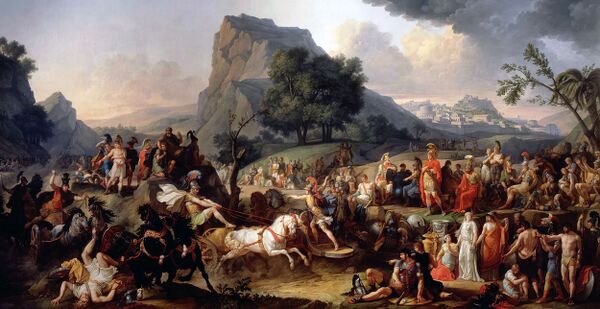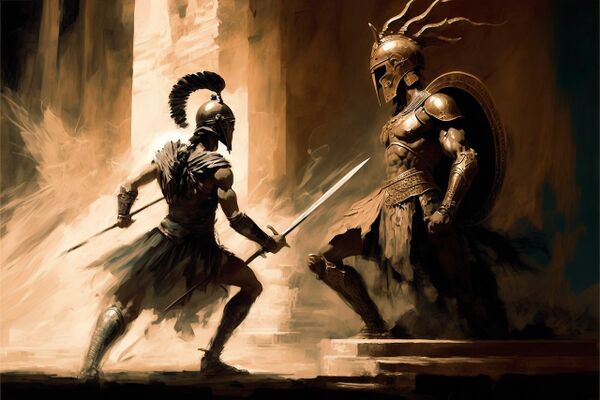The hero and the heroic ideal are central themes in ancient Greek literature, particularly in epic poetry. The concept of the hero has evolved over time and has had a significant impact on Western culture.
The epic hero embodies the ideal of excellence (arete) in all aspects of life. The hero is often a warrior who possesses exceptional physical strength, courage, and skill in battle. However, the hero is also expected to possess intellectual and artistic skills, as well as moral virtues such as justice, wisdom, and compassion. Epic heroes are members of the aristoi or the noblest members of society, and they received the finest education and cultural development, know as paideia. Epic heroes were expected to possess not only physical strength and prowess but also intellectual and artistic skills. The education of heroes was seen as a lifelong process, and heroes were expected to continue their development throughout their lives. The ideal hero strives to be a well-rounded individual who embodies the highest ideals of ancient Greek culture.

The epic hero has a long history in ancient Greek literature, dating back to the Homeric epics, the Iliad, and the Odyssey. These two epics are among the earliest surviving examples of Greek literature and have had a profound impact on Western culture. The heroes in these epics, Achilles and Odysseus, are still celebrated today for their heroic deeds and noble qualities.
In epic poetry, the hero is often defined by his or her relationship to the concept of timē. Timē is an ancient Greek term that refers to honor or esteem, particularly in relation to social status and reputation; think of it as family honor. The hero earns timē through various means such as displaying physical prowess in battle, demonstrating moral virtue, or acquiring material wealth. Timē may be inherited through one’s family or lineage, as social status was highly stratified in ancient Greek society. Timē is central to the narrative of the Iliad, as Achilles’ decision to withdraw from battle is driven in part by his anger at having his timē threatened by Agamemnon.
The concept of arete is also central to the heroic ideal in epic poetry. Arete is an ancient Greek term that refers to the concept of excellence or virtue. The hero is expected to embody arete in all aspects of life, including physical prowess, intellectual skill, and moral virtue. The hero’s pursuit of arete is a lifelong process that involves constant self-improvement and personal growth.
Arete is often displayed through aristeia, or the moment in an epic poem when a hero experiences a period of exceptional valor or excellence in battle. This can often be seen as a defining moment for the hero, and it is often the culmination of their training, skill, and courage. In many ways, aristeia represents the ultimate expression of the heroic ideal, as it embodies the hero’s ability to rise above their ordinary limitations and achieve greatness in the face of adversity. Epic poetry celebrates this quality as a symbol of the hero’s noble character and their willingness to risk everything for the sake of their people or their cause.

Examples of aristeia can be found throughout Greek epic poetry, including in the Iliad, where heroes such as Achilles, Diomedes, and Hector all experience moments of exceptional valor and skill in battle. These moments serve to highlight the hero’s unique abilities and character, and they often play a pivotal role in the hero’s overall journey and transformation.
The hero’s moment of exceptional valor and excellence in battle can often be seen as a double-edged sword, as it can lead to both great glory and tragic consequences, as is the case with Patroclus in the Iliad. His aristeia ultimately leads to his downfall, as he becomes too ambitious (hubris) and takes on Hector, the Trojan prince, who kills him in battle. While Patroclus is celebrated for his bravery and skill in battle, his death is a tragic loss for the Greeks and for his close friend, Achilles.
Similarly, in the Odyssey, the hero Odysseus experiences his own moments of aristeia, but these moments are often tempered by the challenges and hardships he faces on his journey home. While Odysseus is celebrated for his cunning and bravery in battle, his journey is also marked by loss and tragedy, as he faces numerous obstacles and loses his men along the way.
The heroic ideal in epic poetry has had a lasting impact on Western culture. The concept of the hero has been celebrated in literature, film, and other forms of media—even sports. The archetype of the hero is still prevalent in modern culture, and heroes such as Superman and Wonder Woman are often seen as modern-day embodiments of the heroic ideal.
